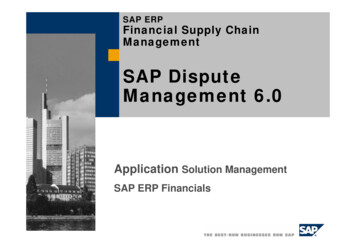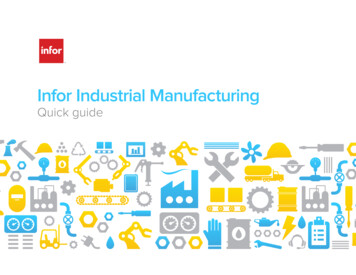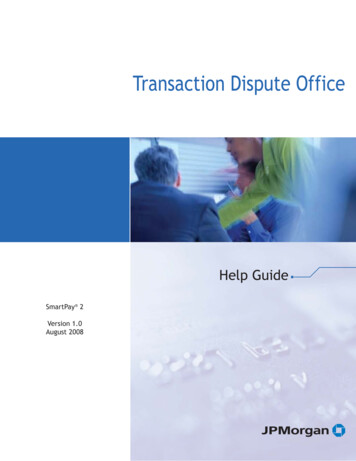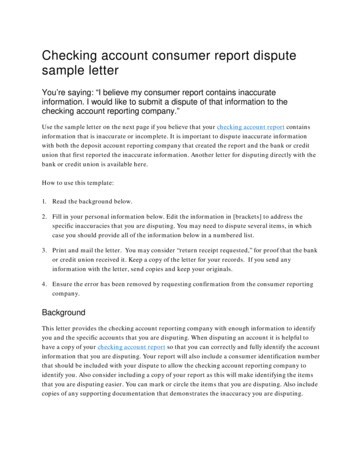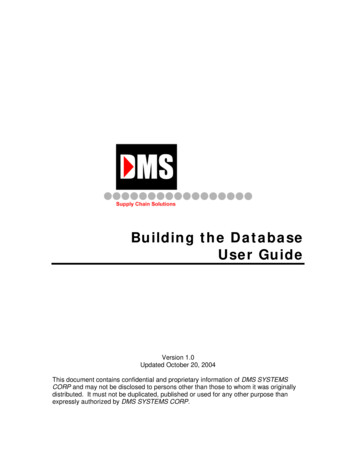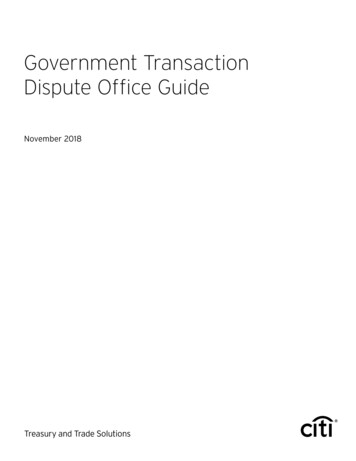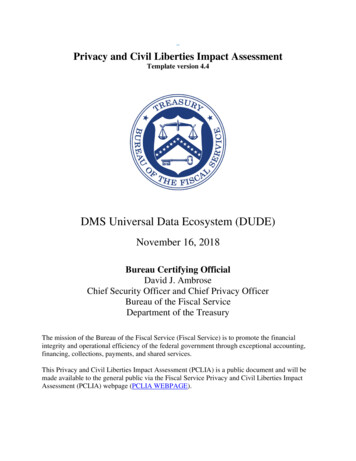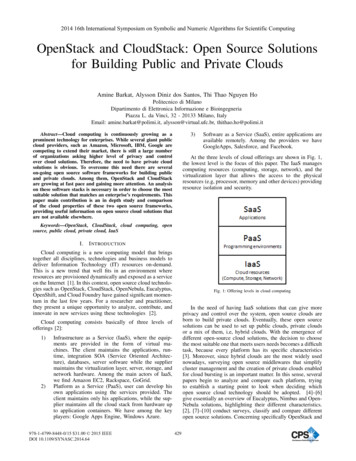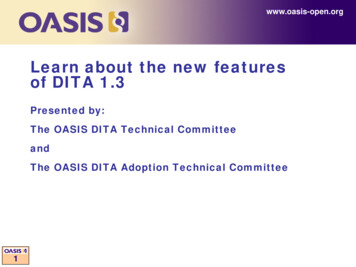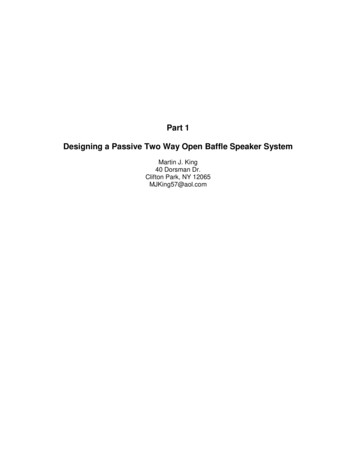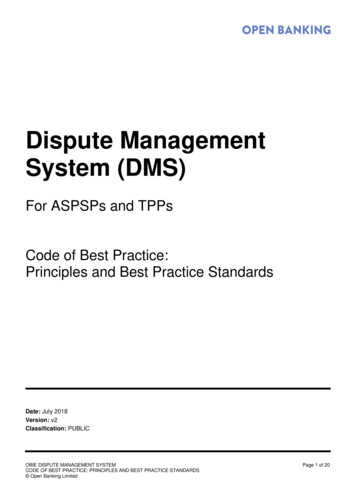
Transcription
Dispute ManagementSystem (DMS)For ASPSPs and TPPsCode of Best Practice:Principles and Best Practice StandardsDate: July 2018Version: v2Classification: PUBLICOBIE DISPUTE MANAGEMENT SYSTEMCODE OF BEST PRACTICE: PRINCIPLES AND BEST PRACTICE STANDARDS Open Banking LimitedPage 1 of 20
Contents1Introduction and Overview32Background43Scope and definitions54Becoming a member of the DMS and Code95Principles106DMS and Best Practice Standards127Mediation, Adjudication and Arbitration Best Practice Standards158Appendix 1 Definition of Terms18OBIE DISPUTE MANAGEMENT SYSTEMCODE OF BEST PRACTICE: PRINCIPLES AND BEST PRACTICE STANDARDS Open Banking LimitedPage 2 of 20
1 Introduction and OverviewThis Code of Best Practice (hereafter the ‘Code’) sets out the principles and best practice standards tobe adhered to when following the Dispute Management System (hereafter the ‘DMS’).The Dispute Management System (hereafter the ‘DMS’) supports the communication and exchange ofinformation in relation to the management of payment initiation and account information servicetransaction-related enquiries, complaints or disputes between Account Servicing Information Providers(ASPSPs) and Third Party Providers (TPPs). These enquiries, complaints and disputes can be thoseinitiated by either a payment service user (PSU), an ASPSP or a TPP.A primary principle of the DMS and Code is for parties to make every effort to ensure that claimants aretreated fairly, impartially and receive the best possible outcome (see Section 5).The DMS is for: Requests and exchanges of information between ASPSPs and TPPs in relation to enquiries,complaints and disputes. Requests for redress repayment (e.g. where an ASPSP has paid out in response to a case, butfault lies with another party). Complaints forwarding.The DMS offers: An open communication process for ASPSPs and TPPs. A solution to allow two or more parties to engage that were previously unknown to each other. Support to ASPSPs and TPPs in the collection of information from other parties necessary tohandle enquiries, complaints and disputes. Support to ASPSPs and TPPs in delivering an improved PSU experience. Governance around the management of payment initiation and account information servicetransaction-related enquiries, complaints or disputes.The DMS and Code are both voluntary and are not limited to those enrolled with Open Banking.The DMS and Code are complementary to and not a replacement of: Any existing policies, procedures or agreements within or between parties in relation tocomplaints, disputes or enquiries management. Any solutions for adjudication, mediation or arbitration or the Financial Ombudsman Service(FOS). Any legal or regulatory requirements that exist.OBIE PUBLIC HOW TO GUIDE: CONSENT MODEL, Open Banking LimitedPage 3 of 20
Main Text2 Background2.1Background to Open Banking and the Open Banking Implementation Entity (OBIE)2.1.1The Competition and Markets Authority (CMA) retail banking market investigation concluded thatolder and larger banks do not have to compete hard enough for customers’ business, and smallerand newer banks find it difficult to grow. This means that many people are paying more than theyshould for their banking activities and are not benefiting from new services.2.1.2To tackle these problems, the CMA is implementing a wide-reaching package of reforms. One ofthe remedies is Open Banking. Open Banking enables personal customers and small businessesto share their data securely with other banks and with third party providers, allowing them tocompare products on the basis of their own requirements and to manage their accounts withouthaving to use their bank.2.1.3To deliver Open Banking, a new organisation was created and is working with the nine Banksmandated by the CMA (Allied Irish Bank, Bank of Ireland, Barclays, Danske, HSBC, LloydsBanking Group, Nationwide, RBS Group, Santander), as well as Challenger Banks, Fintechs,Third Party Providers, Consumer Groups and other parties to define and develop the requiredApplication Programme Interfaces (APIs), security and messaging standards that underpin OpenBanking.2.2Background to the DMS and Code2.2.1The DMS enables the communication and exchange of information for the management of apayment initiation and account information service transaction-related enquiry, complaint ordispute.2.2.2 The DMS is for: Requests and exchanges of information between ASPSPs and TPPs in relation to enquiries,complaints and disputes. Requests for redress repayment (e.g. where an ASPSP has paid out in response to a case, butthe liability may lie with another party); Complaints forwarding.OBIE DISPUTE MANAGEMENT SYSTEMCODE OF BEST PRACTICE: PRINCIPLES AND BEST PRACTICE STANDARDS Open Banking LimitedPage 4 of 20
2.2.3 The principal aim of the DMS is two-fold; to: Improve the experience of the PSU (Payment Service User) by ensuring an efficient process forenquiry, complaint or dispute management between ASPSPs and TPPs, and: Provide those involved with the opportunity to effectively and efficiently communicate, in aconsistent manner, in relation to a complaint, dispute or enquiry. Improve the experience of the PSU (Payment Service User) by ensuring an efficient process forenquiry, complaint or dispute management between ASPSPs and TPPs, and: Provide those involved with the opportunity to effectively and efficiently communicate, in aconsistent manner, in relation to a complaint, dispute or enquiry.2.2.4The Code sets out best practice standards in relation to the DMS.2.2.5 The principal aim of the Code is to: Set out common best practice standards and principles for ASPSPs and TPPs to adhere towhen applying the DMS.3 Scope and definitions3.1Scope of the DMS and Code3.1.1The DMS and Code are both voluntary.3.1.2The DMS and Code are complementary to, rather than a replacement of, any existingpolicies, procedures or agreements within or between parties in relation to enquiries,complaints or disputes management. The DMS does not replace or override any legal orregulatory requirements that exist.3.1.3 The DMS offers: An open communication process for ASPSPs and TPPs. A solution to allow two or more parties to engage that were previously unknown to each other. Support to ASPSPs and TPPs in the collection of information from other parties necessary tohandle enquiries, complaints and disputes. Support to ASPSPs and TPPs in delivering an improved PSU experience. Governance around the management of payment initiation and account information servicetransaction-related enquiries, complaints or disputes.OBIE DISPUTE MANAGEMENT SYSTEMCODE OF BEST PRACTICE: PRINCIPLES AND BEST PRACTICE STANDARDS Open Banking LimitedPage 5 of 20
3.1.4 The DMS does not offer: A liability model or a model for enquiry, complaint or dispute resolution.3.1.5 The DMS and Code are complementary to and not a replacement of: Any existing policies, procedures or agreements within or between parties in relation tocomplaints, disputes or enquiries management. Any solutions for mediation, adjudication or arbitration, including the Financial OmbudsmanService (FOS). Any legal or regulatory requirements that exist.3.1.6The Code’s provisions apply throughout the DMS.3.1.7 The following parties can be Members of the DMS and Code: Account Service Payment Service Providers (ASPSPs). Account Information Service Providers (AISPs). Payment Initiation Service Providers (PISPs).3.1.8The use of the DMS and Code are not limited to entities that are enrolled with OpenBanking.3.1.9The following other entities are not members of the DMS and Code but may be impactedby them: Payment Service Users (PSUs) Merchants (product or service providers) Financial Conduct Authority (FCA), Information Commissioner’s Office (ICO) and otherregulatory bodies Financial Ombudsman Service (FOS), any appointed mediator, adjudicator or arbitrator oralternative dispute resolution service (ADR)OBIE DISPUTE MANAGEMENT SYSTEMCODE OF BEST PRACTICE: PRINCIPLES AND BEST PRACTICE STANDARDS Open Banking LimitedPage 6 of 20
3.2Definition of enquiry, complaint and dispute3.2.1Definition of enquiryThe DMS considers that an ‘enquiry’ is:Any request for information or clarity from a PSU, ASPSP or TPP about the provision of, or failure toprovide a payment initiation or account information service that does not fall within the definition ofcomplaint.3.2.2Definition of complaintThe DMS considers that a complaint is:Any oral or written expression of dissatisfaction, whether justified or not, from, or on behalf of, a PSU,ASPSP or TPP about the provision of, or failure to provide, a payment initiation or account informationservice, which:a. Alleges that the complainant has suffered (or may suffer) financial loss, distress orinconvenience; andb. Relates to an activity of the respondent, or of any other respondent with whom that respondenthas some connection in marketing or providing financial services or products.3.2.3Definition of disputeThe DMS considers that a 'dispute' is:Any conflict in opinion between an ASPSP(s) and/or TPP(s) in relation to a case.3.3In-scope complaints, disputes and enquiries3.3.1A complaint, dispute or enquiry can be rendered in-scope of the DMS and Code if:a. It relates to a payment initiation or account information service transaction, and:b. At least one party to it is a member of the DMS and Code.OBIE DISPUTE MANAGEMENT SYSTEMCODE OF BEST PRACTICE: PRINCIPLES AND BEST PRACTICE STANDARDS Open Banking LimitedPage 7 of 20
3.3.23.43.4.1The enquiries, complaints and disputes can be those initiated by either a PSU, anASPSP or a TPP.Definition of claimant, case recipient, case respondentDefinition of a claimant:The DMS considers that a claimant is: A PSU, ASPSP or TPP that makes a verbal or written expressionof an in-scope complaint, dispute or enquiry.3.4.2Definition of a case recipient:The DMS considers that a case recipient is: An ASPSP or TPP that receives a verbal or writtenexpression of an in-scope complaint, dispute or enquiry.3.4.3Definition of a case respondent:The DMS considers that a case respondent is: An ASPSP or TPP that is party to the in-scope complaint,dispute or enquiry that is neither the claimant nor the case recipient.OBIE DISPUTE MANAGEMENT SYSTEMCODE OF BEST PRACTICE: PRINCIPLES AND BEST PRACTICE STANDARDS Open Banking LimitedPage 8 of 20
4 Becoming a member of the DMS and Code4.1Signing up to the DMS and Code4.1.1Those wishing to sign up to the DMS and Code should submit an application form on theOpen Banking ispute-management-system/4.1.2Existing members should submit an update form on the Open Banking website to makeOBIE aware of any amendments or ispute-management-system/4.1.3OBIE aims to process requests within 10 business days and details provided will bepublished on the DMS contact list on the Open Banking website (hereafter the ‘ContactList’).4.1.4OBIE will conduct verification and eligibility checks on DMS members. These checks willbe based on known standards and processes equivalent to levels that meet civil courtrequirements. OBIE will also verify details of the authorisation/registration of regulatedentities on the relevant competent authority register, where appropriate.4.1.5To ensure the DMS is accessible to all ASPSPs and TPPs, sign-up is free and thesupplementary materials are available at no cost.4.1.6Members join an active community that considers how to improve and enhance dispute,complaints and enquiry resolution in the context of the DMS.4.2Contact list of DMS and Code members4.2.1Members of the DMS and Code will be asked to provide the following details for theContact List: Legal entity name Known as (this could be trading name, brand or product type) Generic business email address Postal addressOBIE DISPUTE MANAGEMENT SYSTEMCODE OF BEST PRACTICE: PRINCIPLES AND BEST PRACTICE STANDARDS Open Banking LimitedPage 9 of 20
4.2.2By providing this information, that member is agreeing to have it published on theContact List, publicly displayed on the Open Banking ispute-management-system/4.2.3The Contact List is publicly available. It is a tool for members of the DMS to identify andmake contact with other members when managing a complaint, dispute or enquiry.4.2.4The Code is owned by OBIE. Updated versions of the Code will be communicated tothose members listed on the Contact List using the email addresses provided.5 PrinciplesSet out below are the principles that all members of the DMS are expected to adhere to when handling adispute, complaint or enquiry.5.1.1A member of the DMS agrees and acknowledges that, during the DMS they will always:5.1.1.1 Treat PSUs and all parties fairly: Ensure it does not operate any unreasonable barriers for PSUs, ASPSPs or TPPs to submit acomplaint, dispute or enquiry. Make every effort to ensure that claimants are treated fairly, impartially and receive the bestpossible outcome. Exercise good faith. Communicate fully and transparently. Ensure that all communication in relation to the DMS adheres to the Code. Coordinate their respective efforts. Make every effort to achieve a timely resolution. Ensure as far as possible that cases are resolved without the need to proceed to mediation,adjudication or arbitration.5.1.1.2 Exchange data and information appropriately and securely: Ensure all data is exchanged in a secure manner (either secure e-mail exchange or by post). Only use the information relating to a complaint, dispute or enquiry in relation to the resolutionof that complaint, dispute or enquiry. Respect any supplementary materials to the DMS and utilise them as intended.OBIE DISPUTE MANAGEMENT SYSTEMCODE OF BEST PRACTICE: PRINCIPLES AND BEST PRACTICE STANDARDS Open Banking LimitedPage 10 of 20
Provide any nominated adjudicator with all relevant information relating
The Dispute Management System (hereafter the ‘DMS’) supports the communication and exchange of information in relation to the management of payment initiation and account information service transaction-related enquiries, complaints or disputes between Account Servicing Information Providers (ASPSPs) and Third Party Providers (TPPs). These enquiries, complaints and disputes can be those .
